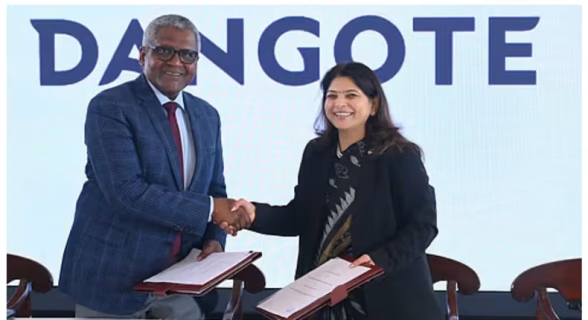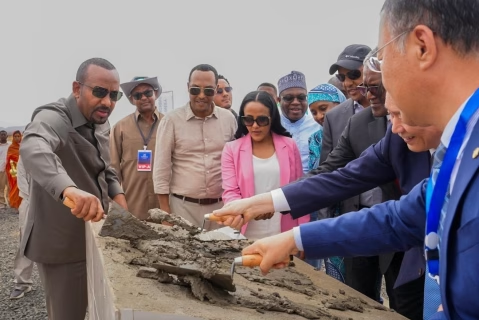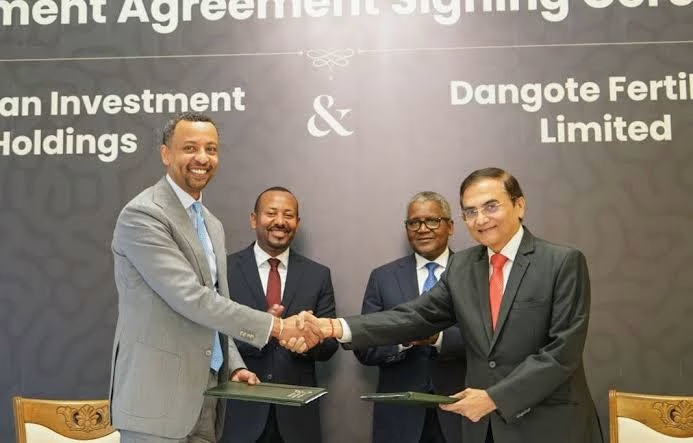Updated October 2, 2025:
The Gode fertiliser plant and oil refinery projects are infrastructure developments being implemented in the Somali Regional State of Ethiopia. Construction activities commenced for both facilities. The oil refinery is planned to have a production capacity of approximately 3.5 million tonnes of refined fuel per year. Moreover, it will be developed by China’s Golden Concord Group Limited (GCL) in partnership with Ethiopian Investment Holdings. The facility is intended to process crude oil and condensate sourced from the Hilala oil field. The fertiliser plant is planned to be developed by the Dangote Group, with representatives from the company present at the project’s foundation-laying ceremony. According to government officials, the projects are intended to support domestic fuel and fertiliser production and to reduce reliance on imported petroleum products.
Other than the Gode fertiliser plant, Dangote Group is also working on its Dangote refinery expansion in Lagos. West Africa’s Dangote Group has inked a $350 million deal with india’s state-owned Engineers India Ltd to for Dangote Refinery expansion in Lagos. The expansion is expected to involve the addition of a second processing plant. Conversely, this will increase refining capacity from 650,000 barrels per day (p/d) to 1.4 million barrels p/d. Moreover, output will be focused on Euro VI-compliant fuels. Under the renewed agreement, EIL will serve as Project Management Consultant (PMC) and Engineering, Procurement, and Construction Management (EPCM). This move replicates the role it played during the refinery’s initial development which was commissioned in 2024. Once complete, the expansion will position the Dangote facility among the world’s largest single-site refinery.

August 28, 2025:
Ethiopia has signed an agreement with Nigeria’s Dangote Group to construct $2.5 billion Gode Fertiliser Plant. This information was revealed by Ethiopia’s Prime Minister Abiy Ahmed on Thursday in a post on social media platform X.
Furthermore, this mega investment is part of Nigerian billionaire Aliko Dangote’s efforts which seeks to end Africa’s fertiliser imports. Also, this project will be part of Dangote’s expansion into Africa and economic empowerment in the region. One of the major investments owned by Dangote in the continent include the largest oil refinery in Africa.
Project Factsheet
Location: Gode, Ethiopia
Cost: Approximately $2.5 billion
Capacity: The facility is designed to have an annual production capacity of up to 3 million metric tons of urea. This would make it one of the largest single-site urea production complexes in the world.
Product: The plant will primarily produce urea fertilizer, with potential for future expansion into other ammonia-based fertilizers such as ammonium nitrate and ammonium sulfate.
Timeline: Construction is targeted for completion within 40 months from the start of the project.
Partnership: A joint venture between Dangote Group (60% ownership) and Ethiopian Investment Holdings (EIH) (40% ownership).
Objective: To reduce Ethiopia’s reliance on imported fertilizer, enhance agricultural productivity, and position the country as a regional hub for fertilizer production and export.
Importance:
- Economic Impact: The project is expected to significantly benefit Ethiopia’s agricultural sector, which employs over 70% of the population. Additionally, by providing a stable and affordable supply of fertilizer, it aims to boost crop yields, improve farmer incomes, and contribute to national food security.
- Industrialization: The Gode fertilizer plant represents one of the largest industrial investments in Ethiopia’s history and aligns with the government’s Homegrown Economic Reform II (HGER II) plan. It is expected to create thousands of direct and indirect jobs and stimulate economic activity in the region.
Location of the Fertiliser Plant

Additionally, this mega fertiliser plant will be located in Gode town in Ethiopia’s Southeastern side. The plant will produce 3 million metric tons of fertiliser a year, Abiy further revealed.
The agreement that will foresee the construction of the fertiliser plant was signed by state-owned Ethiopian Investment Holdings (EIH) and Dangote Group.
Shareholders’ Stake
Ethiopia will hold a 40% stake in the venture. On the other hand, Dangote Group will own 60%. EIH Chief Executive Brook Taye revealed this information at the signing ceremony in Addis Ababa.
Also, an EIH statement on X quoted billionaire Dangote as saying that the investment represented a “shared vision to industrialise Africa and achieve food security across the continent”.
Similar Project
African countries are making steps in developing local fertilizer hubs and plants in order to cut dependence on imports. Likewise, Ghana has received $5 billion investment that will foresee the establishment of a fertilizer hub at Atuabo. The development of these fertilizer projects showcase the steps African countries are making to cut foreign dependence and make fertilizer easily accessible to farmers by local production.

Leave a Reply